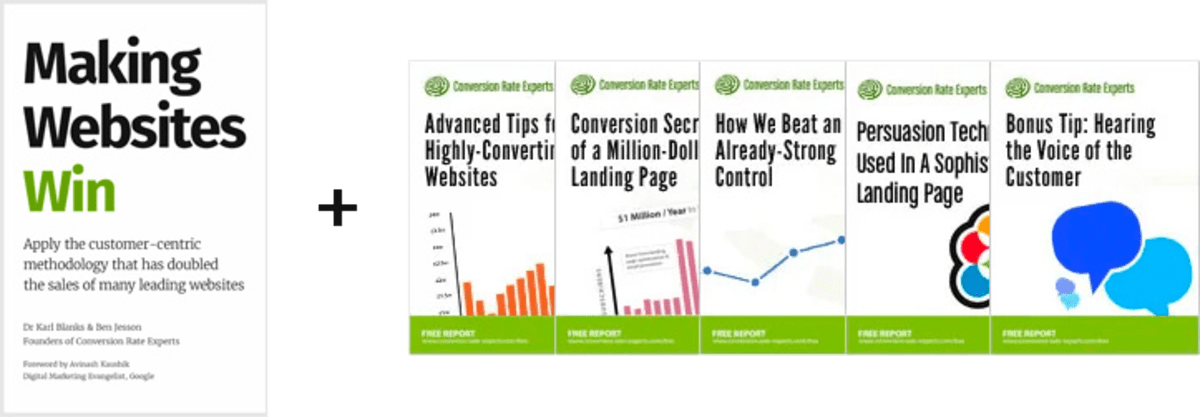The ultimate guide to proof: Highly effective ways to boost your company’s credibility (and sales)
Published: January 2025

This is usually because your website lacks relevant proof elements. There simply isn’t enough proof that the visitors should use you.
What is a proof element, and why should you care?
A proof element is any piece of evidence that builds trust and credibility with your prospects. In marketing, and CRO in particular, proof elements are what you use to persuade potential customers by showing that your product, service, or claim is reliable, effective, and trustworthy.
Copywriting legend Gary Bencivenga has this to say about proof:
“Never make your claim bigger than your proof. And always join your claim and your proof at the hip in your headlines, so that you never trumpet one without the other. There is no more powerful nor consistent way to explode your response. Surround your claims with stronger, bolder proof and watch your response soar.” Source.
In other words:
- Claims without credible evidence fall flat.
- Effective content must convince skeptical audiences by substantiating every assertion.
Providing ample, credible proof is essential in building trust and persuading potential customers. For Bencivenga, proof isn’t just about making a claim; it’s about showing clear, unexaggerated, undeniable evidence to back it up.
Seems obvious, doesn’t it? Yet most businesses get it wrong. We’ll show you why—and, more importantly, how to get it right.
Why your “proof” may be less persuasive than you think
Take a look at your website—or a competitor’s. Focus only on the proof elements in the top section of your main landing page.
Count how many of those proof elements look like this:
- #1 Mattress store in America.
- Seattle’s Finest Coffee.
- Best in Class Oboe Lessons.
Unless they are backed up by specific proof, vague, unsubstantiated claims like these usually fail to persuade. How do we know? We’ve surveyed hundreds of thousands of customers, and the data speaks for itself.
Seven types of persuasive proof
What kind of proof should you add? There are tens—maybe hundreds—of ways to show trust and credibility. Some of them are particularly suited to certain types of businesses, but most businesses benefit from the following:
Size and growth rate
Visitors are greatly influenced by the size and success of companies because we are psychologically drawn to the safety of successful groups.
For daFlores, Latin America’s largest network of florists, we gained a 44% uplift in sales by highlighting how many Facebook fans the company had.
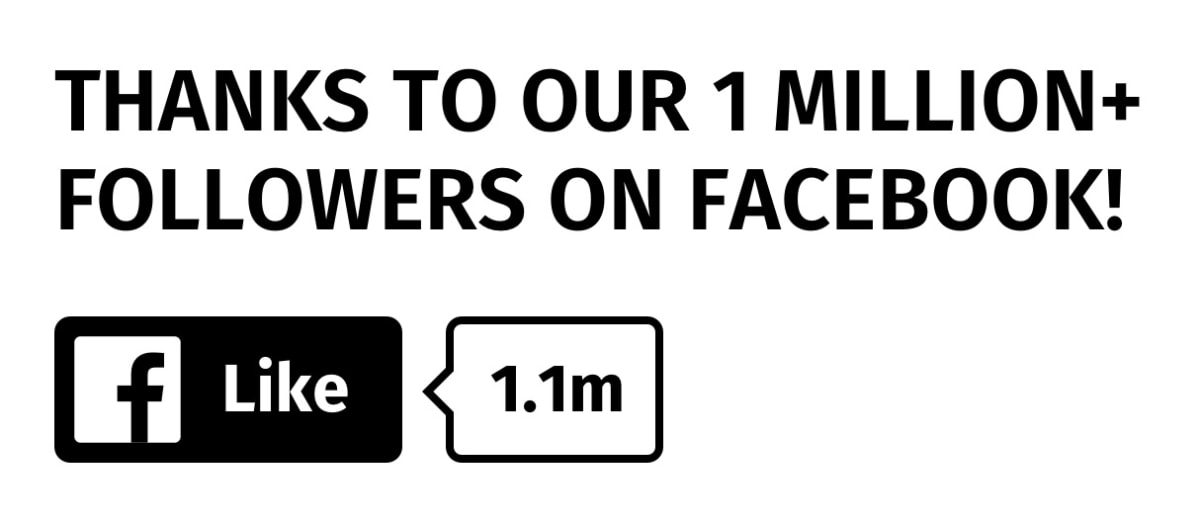
(That’s not strictly true—we actually said, “iGRACIAS a nuestro más de 1 millón de seguidores en Facebook” because they’re based in Colombia.)
Recommendations and testimonials (particularly from authorities and experts)
Reviews or recommendations from authorities and celebrities carry particularly persuasive weight due to Authority Bias, a psychological tendency instilled at an early age to respect the opinions of parents, teachers, and those in positions of power.

Data and statistical evidence
Buyers are much more likely to believe your claims if you support them with hard data.
- So, if you sell cat food, it’s not enough to say that cats like the taste of it. Why would people believe you? A popular cat food brand supported its claim with data: “Eight out of ten owners said their cat prefers it.”
- Insurance companies don’t say, “We make it easy to save on car insurance.” They support their claims with data, like: “15 minutes can save you 15 percent or more on car insurance.”
- Restaurants that deliver fast food don’t say, “We’ll be there as fast as our bikes can carry us—we promise.” They say things like “Delivered in 30 minutes—or it’s free.”
- Hand soap manufacturers don’t say that their product “Kills a lot of germs.” They say, “Kills 99.9% of germs.” It sounds much more convincing.
And if you sell “healthy” food, it’s a good idea to use numbers, especially if you can demonstrate your difference visually.

Data and statistics appeal to the rational side of the brain and our human need for cognitive consistency. Whether true or not, we like to believe that we make decisions based on facts and logic.
Guarantees
As we discuss elsewhere, guarantees don’t just reduce the buyer’s risk; they also act as a form of proof. A good guarantee tacitly promises that your business will be harmed if it doesn’t honor its claims. It effectively says, “Our promise must be true. Otherwise, we wouldn’t be in business.”
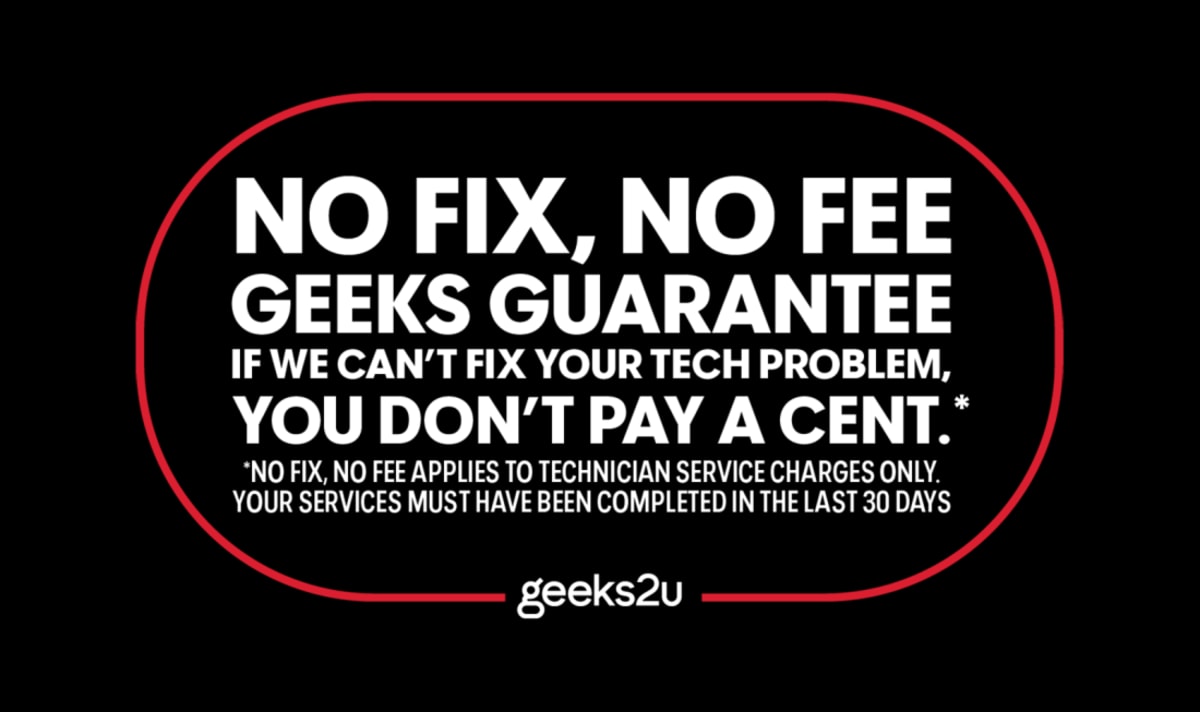
Celebrity associations
Celebrity associations can be more effective than you might expect. When selling a diet, for example, many people will be more influenced by a celebrity figurehead than by scientific research.

Over the years, we have paired several of our clients with celebrity figureheads. Most of the celebrities allow their image to be used in return for a fixed fee for a specific duration. In one case, the celebrity was happy to do it for free, because she was a fan of the company.
A word of warning. Before you commit to a deal, you may choose to first run an A/B test to measure how the celebrity affects conversions. One of our clients had a celebrity figurehead whose presence actually reduced sales. The client’s branding agency hadn’t carried out A/B tests (we’ve yet to see one that does), and so was oblivious that they had caused such damage.
Demonstrations
Sometimes, the best way to prove something is to demonstrate it.
In one classic example, Tom Dickson, the founder of Blendtec, wanted to showcase the power and durability of his blenders in a way that was fun, engaging, and memorable. Dickson, who had a background in engineering, would often test the durability of his blenders with unusual items in the company’s test kitchen. One day, a colleague suggested filming these tests and turning them into short videos. Thus, “Will It Blend?” was born.
The videos feature Dickson, wearing a lab coat and safety glasses, calmly blending all sorts of unconventional objects, including marbles, iPhones, golf balls, and even rake handles, to answer the question: “Will it blend?” Spoiler: most things do blend—into a fine powder.
The idea was wildly successful, with many videos getting millions of views and communicating the power of the company’s products.
Here’s an alternative style of demonstration from a cycling company:

A poster showing the space required to transport seventy-two people by either car, bus, or bicycle. The photos demonstrate, better than words ever could, how single-occupancy cars take up a disproportionate amount of road space.
If you are looking to create great demonstrations, read our article: The power of product demonstrations: What we can learn from elevators, elephants, and vacuum cleaners.
Social proof
In our case study about how we grew Crazy Egg’s conversion rate by 363%, our winning landing page featured some of Crazy Egg’s prestigious clients.
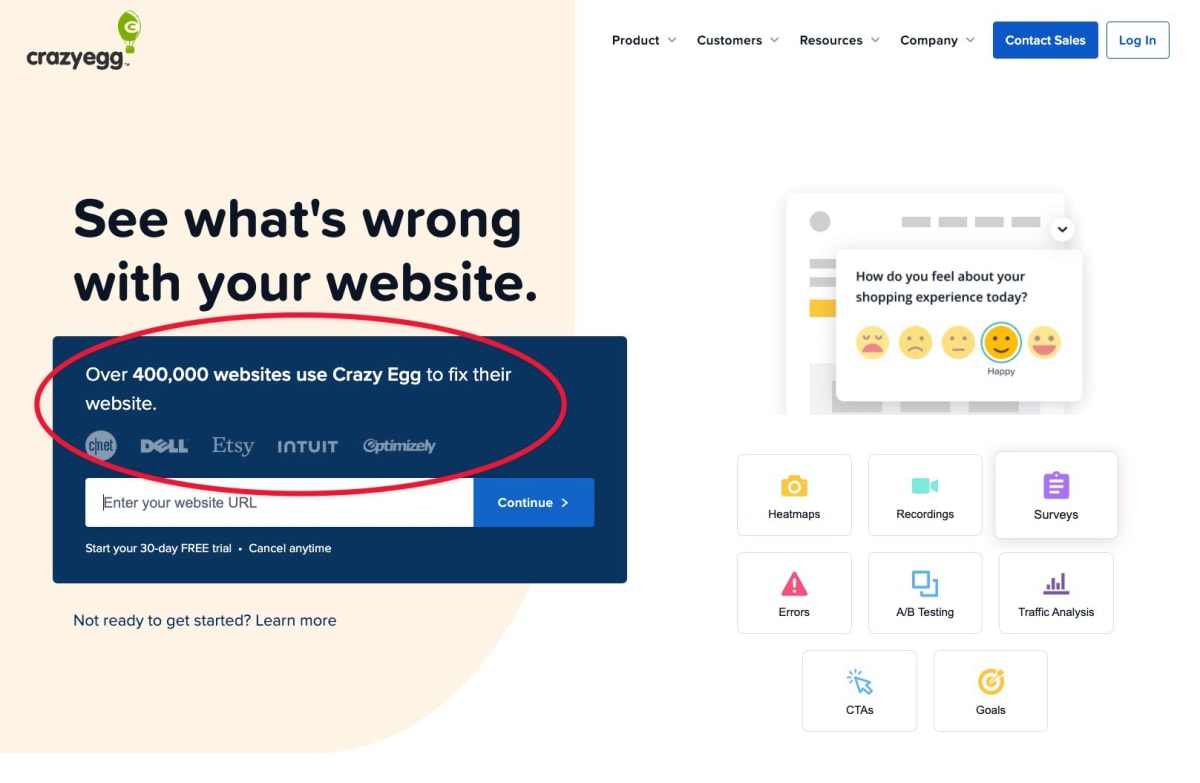
Similarly, when we made over $1 million for Moz, one of our winning pages had a headline that incorporated the names of some of Moz’s prestigious clients.

This type of marketing is called Social Proof, a cognitive trick that allows us to shortcut mental work in favor of a simple assumption—if many others are doing something, it must be correct, valuable, or desirable. Buyers are reassured when they see that others similar to themselves have already chosen—and like—a particular company.
Three steps to develop a proof strategy
Once you have seen the power of proof, it makes sense to invest in finding and creating it.
1. Find and leverage your “hidden” proof
The world may already contain a vast amount of proof of your company’s merits, much of which you probably take for granted. Across the web, there could be a lot of content that would persuade your visitors if only they were to see it.
Here are some of the places we’ve found hidden proof for our clients:
- Review sites like Trustpilot, TripAdvisor, and Google Reviews.
- Online retailers like Amazon or specialists like Expedia.
- Social media platforms like Facebook, Reddit, LinkedIn, Instagram, and YouTube.
- Special interest blogs, newsletters, and Substacks.
- Forgotten PR files and “cuttings.”
- Client and employee exit interviews.
When we do this kind of search, we often find that only a fraction of a client’s proof is ever seen by their visitors—either because it’s not on the website or because it’s tucked away in the corner of a dusty blog page.
Make sure your visitors see this proof by incorporating the best of it into your most-visited pages. When we did this for our client, TopCashback, it helped them win the FastTrack100 award three times in a row.
2. Rank and prove your proof
For each of your proof elements, you can also ask the following questions, moving the stronger proof to the top of the pile with each pass:
- Do we have a statistically significant volume of this proof?
- Does the proof have compelling, visible, tangible, and quantitative evidence from a transparent methodology?
- If your proof flies in the face of conventional wisdom or thinking, you’ll need to make it even stronger to convince people.
- Is the proof relevant, objective, valid, reliable, and accurate?
- If objective experts in your field (your customers or competition) were to scrutinize and try to poke holes in your proof - how could they do that?
- Can you fix that? Can you iteratively improve that part of your product or service? Hint: ask your customers.
- Where you can’t fix “holes” in your proof, can you offer a good counter to the objection? For example:
- Objection: You’re twice the price of the competition for scanning my emails for spam!
- Counter Objection: Yes, but we run less than half the scans and catch more spam than the competitors, so you spend less money for a better result.
Done that? Great. But don’t just dump all of that information at the top of your homepage.
Next, we want to prove our proof.
A common method for us is to speak to and survey customers to learn what seems most persuasive about a company’s offering—and then we test their insights across the site.
A quick first test for you could be pitting your proof elements against each other with A/B split testing in a USP bar to see which has the biggest increase in conversion rates. Then, when you find a winning pattern, double down and try that in other places on the website.
The more you test your proof, the more you’ll learn what turns visitors into customers.
3. Invest in building proof
Once you understand what persuades your visitors, you should spend time, money, and ingenuity acquiring those things.
For instance, if your visitors would be most persuaded by:
- An association with an influential online creator… then invest in acquiring that.
- Rave reviews from experts… then work to gain them.
- Video testimonials from delighted clients… then build a capture opportunity into your after-sales process.
- Industry awards… then work to win those awards.
Here’s an example close to our heart. We know that video testimonials are highly persuasive to people looking for genuine CRO expertise, so we’ve invested in collecting them. (109 and counting.)
This approach illustrates an important point: Conversion is not an afterthought. Conversion is identifying what type of company your visitors would ideally love to do business with … and then becoming that company. It means that your customer research determines the direction in which your company grows.
As it should.
Hence, the company’s product strategy and marketing strategy should be led by its conversion team.
What if visitors trust your company but not your product?
Just because visitors trust your website doesn’t mean they have found a product that they trust. Visitors may be happy to use your online pharmacy, but they still need to be persuaded of the efficacy of a particular drug.
A visitor may lack trust for several reasons:
- The product isn’t good.
- The product isn’t described well enough.
- The product isn’t the best choice for the visitor—perhaps because the search functionality or navigation has done a bad job.
In such cases, your job is to persuade the visitor of the merits of the product, but not at the expense of eroding their trust in your company. For example, Amazon explains the benefits and credibility of its products, but retains its trusted-advisor status by including impartial customer reviews.
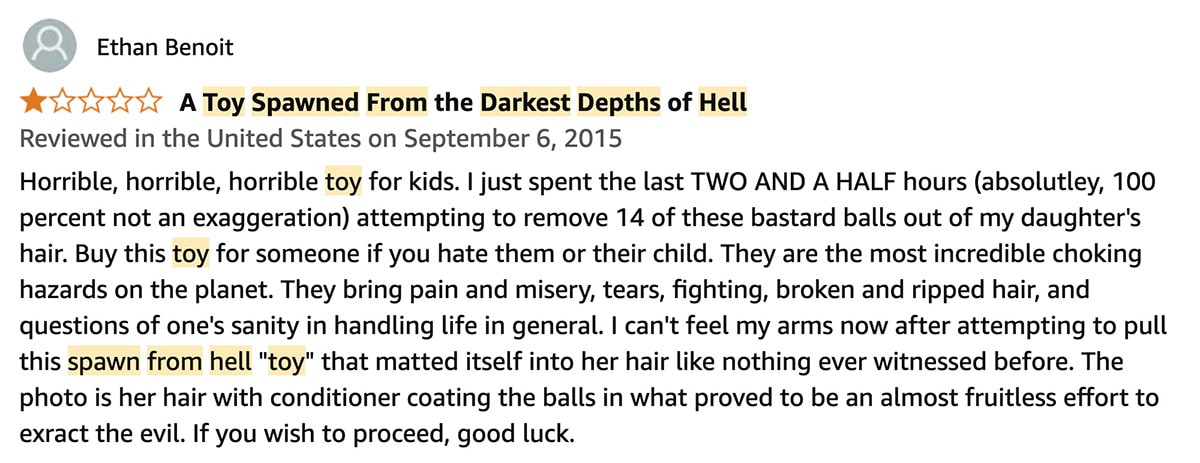
The same types of proof that were effective for building trust in your company (see above) are equally effective at building trust in a product.
Just be aware that “lack of trust in your company” and “lack of trust in the product” are two separate problems. Both must be solved before a customer will place an order.
Make your sales funnel a powerhouse of proof
If your website isn’t proving your claims, it’s like shouting, “Trust me!” in a dark alley. No one’s buying it.
Conversion isn’t just about persuasion—it’s about proof. Find your best proof, make it visible, and test it. Whether it’s data, reviews, or a celebrity endorsement, show your audience that you’re the real deal.
Think of your proof as a punchline—if you don’t deliver, the audience won’t laugh (or convert).
How much did you like this article?
What’s your goal today?
1. Hire us to grow your company
We’ve generated hundreds of millions for our clients, using our unique CRE Methodology™. To discover how we can help grow your business:
- Read our case studies, client success stories, and video testimonials.
- Learn about us, and our unique values, beliefs and quirks.
- Visit our “Services” page to see the process by which we assess whether we’re a good fit for each other.
- Schedule your FREE website strategy session with one of our renowned experts.
Schedule your FREE strategy session
2. Learn how to do conversion
Download a free copy of our Amazon #1 best-selling book, Making Websites Win, recommended by Google, Facebook, Microsoft, Moz, Econsultancy, and many more industry leaders. You’ll also be subscribed to our email newsletter and notified whenever we publish new articles or have something interesting to share.
Browse hundreds of articles, containing an amazing number of useful tools and techniques. Many readers tell us they have doubled their sales by following the advice in these articles.
Download a free copy of our best-selling book
3. Join our team
If you want to join our team—or discover why our team members love working with us—then see our “Careers” page.
4. Contact us
We help businesses worldwide, so get in touch!
© 2025 Conversion Rate Experts Limited. All rights reserved.

